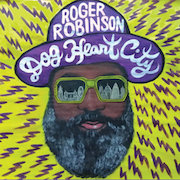Making a welcome arrival on vinyl, following its cassette mixtape release earlier this year, Roger Robinson’s third album finds him reflecting once more on the state of London, its people and the power relations between them. Where Dis Side Ah Town pieced together the before and aftermath of the devastating and divisive riots that shook the city in 2011, Dog Heart City turns its attention to the ever-widening gulf between the haves and the have-nots.
Robinson’s anger from the last LP is continued here, mixing an audible sadness – expressed by his tender falsetto when singing – with the ire let out via the steely determination of the gruffer register in which he delivers the spoken-word passages. His sung vocals follow the tunes, but it’s at the moments that Robinson spells out the starker truths with a careful wisdom that the sense of bleakness really comes through. His firm purpose and the strength of his convictions speak volumes of the bitter experience for many of the harsher aspects of life in a divided capital city.
Just as Denis Bovell’s band have been key to the charged dub background underpinning Linton Kwesi Johnson’s groundbreaking eviscerations of the tensions and trials of life in multicultural Britain since the 1980s, so producer Disrupt is to Robinson’s observations of 21st-century London. He delves into the Jahtari archives for backing tracks to propel Robinson’s poetry into the outer reaches of dub, with Bo Marley and John Frum’s tunes giving an old-school reggae feel, the whole mixed up at the controls alongside a healthy dose of newer and sometimes more adventurous pieces from Disrupt himself.
Robinson’s riveting psychogeographical sketches of young men caught in a spiral of internecine postcode violence on ‘Flowers’ are leavened with biting anger reserved for gentrifying incomers with no sense of heritage who wipe away whole (sub)cultures in a tide of overpriced merlot, while fruit sellers and reggae vendors are disappearing in favour of homogenised high streets. Elsewhere, night buses rock to the sound of the laughter of cleaners who sweep away the bankers’ waste.
‘I used to know these streets’, Robinson laments on ‘New Maps’, where there is ‘now a complete stranger looking at me like I am the danger’, his mocking assessment that the gentrifiers consider that diversity is in fact a kind of cocktail served in the places that replaced the record stores, that brave, new and essentially deracinated place with no roots, no culture – ‘Does heritage mean nothing to you?’, he demands. Then there is the spectre of fascism, as ‘Swastika’ expresses with a ghost of no hope. The chiptune buzz that Disrupt welds onto Frum’s dolorous skank on ‘Corridors’ previews a woeful tale ‘where every day is pain and hardship when you have nobody to laugh with’, telling of a child locked in his tower block flat while his mother toils at McDonald’s ‘serving Happy Meals to other children’.
In the aftermath of the Grenfell Tower disaster and the deaths in police custody of two more young black men leaving families and communities bereft and sparking public protests in Dalston, the deceptively upbeat ‘Bun Bun Bun’ takes on a grim new relevance. London is once again a town where ‘Everybody talking ’bout revolution’, but it seems that ‘marching up and down is no solution’. Here and on the title track, Kiki Hitomi (of WaqWaq Kingdom – also a member of King Midas Sound with Robinson, and who also created the arresting album artwork) lends eerie backing vocals to the dense swirl of Disrupt’s shimmering FX trails.
Immersed in the traditions of dub, Dog Heart City shimmers in the echo chambers and deep bass reverberations, and pulses with a powerful emotional connection to Robinson’s home city at a freshly turbulent moment in its everchanging form. He strips bare the injustices heaped upon the indignities wreaked upon the people with the same passionate sense of right and wrong that Johnson, Benjamin Zephaniah and Prince Far-I have all deployed to consciousness-raising effect. A vintage drum machine on ‘Welcome To Dog Heart City’ beats out the tempo of streets bustling with “iPhone accessories and nail salons… the off-licence selling Special Brew to drunks… people with nothing, all looking for something.”
“Though music blares from cars, shops and tower blocks,” Robinson notes. “Not all music is a celebration.” Sometimes it’s also a warning.


